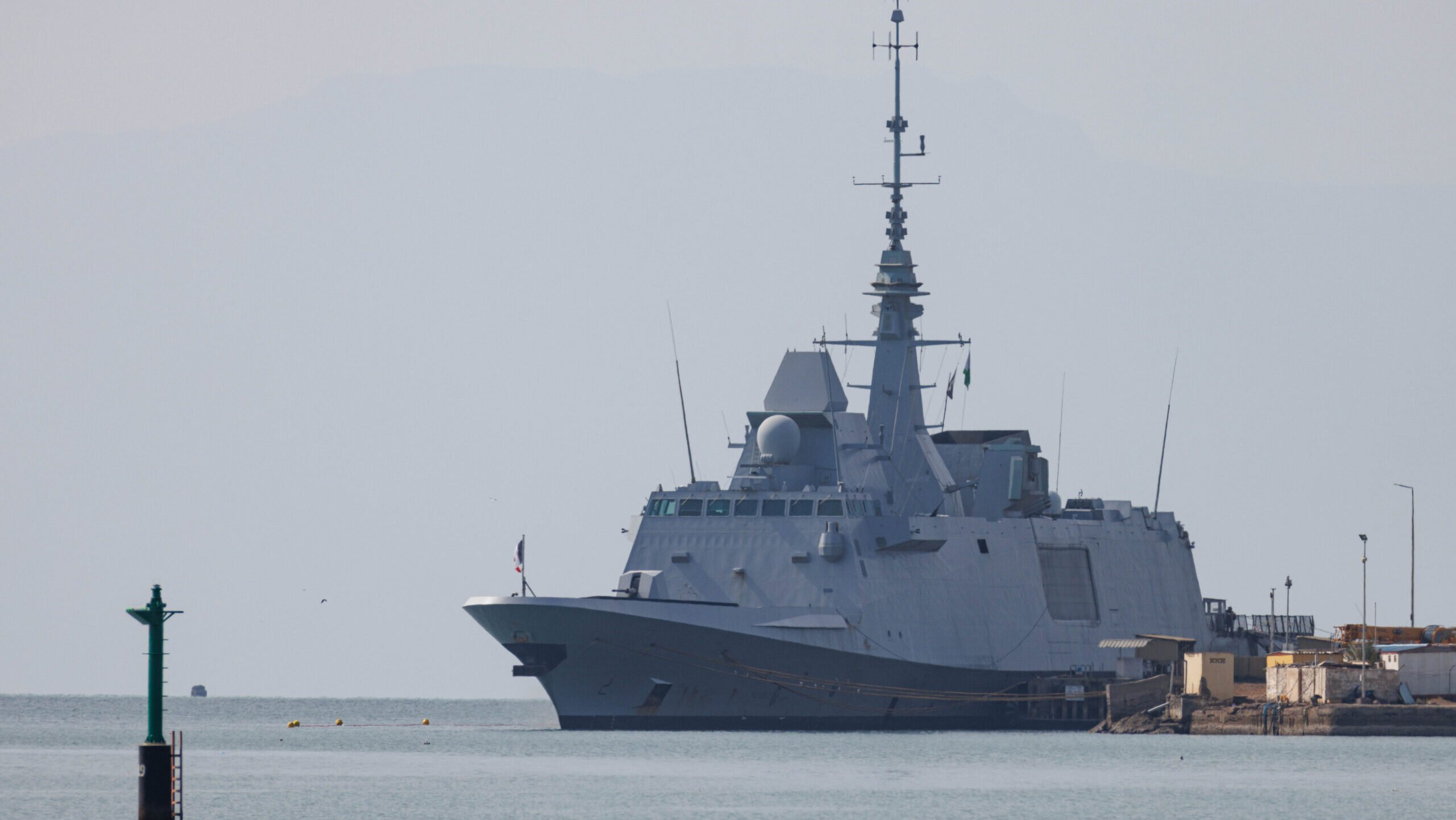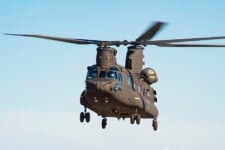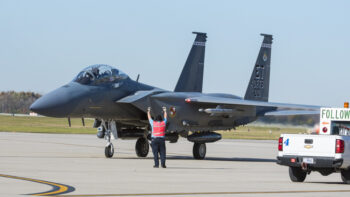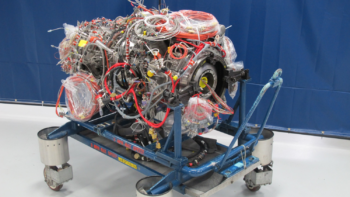
The French navy ship, the FS Languedoc (D653), as seen in port on January 20, 2024 in Djibouti, Djibouti. (Photo by Luke Dray/Getty Images)
BEIRUT — As Greece’s Hydra Frigate reportedly sets sail for the Red Sea, the narrow shipping lanes there are now host to two separate Western missions to protect commercial vessels: the EUNAVFOR Aspides mission launched by the European Union last week and the US-led Operation Prosperity Guardian launched in December.
And though a US military spokesperson told Breaking Defense the two missions will “coordinate defensive operations,” analysts said that the move by the European nations to launch their own mission, rather than join the coalition already in place, signals the push for independence from the US-led operation and Washington’s more aggressive approach to taking on the Houthi threat out of Yemen.
The EU is determined “to forge its own identity in the military realm distinct from NATO, which it sees as US-dominated,” said David Des Roches, associate professor at the Near East South Asia Center for Security Studies. “They have set up parallel operations to NATO operations going back years. In this instance, they also do not want to be seen as part of a US operation, which they fear will have an offensive component.”
US officials have stressed that Prosperity Guardian is a “defensive coalition” and is separate from the offensive American and British military strikes on Houthi targets in Yemen, but it appears some European capitals see value in daylight between the two missions anyway.
A European Red Sea Mission
On Feb. 26, Greece announced it was joining France, Italy and Germany in the Aspides mission, which was formally established on Feb. 19.
“Operation ASPIDES will ensure an EU naval presence in the area where numerous Houthi attacks have targeted international commercial vessels since October 2023,” the EU said in its announcement. “In close cooperation with like-minded international partners, ASPIDES will contribute to safeguard maritime security and ensure freedom of navigation, especially for merchant and commercial vessels. Within its defensive mandate, the operation will provide maritime situational awareness, accompany vessels, and protect them against possible multi-domain attacks at sea.”
When it was first announced on Dec. 18, the US Defense Department said 10 countries would be participating in Prosperity Guardian: the US, the United Kingdom, Bahrain, Canada, France, Italy, Netherlands, Norway, the Seychelles and Spain. Three days later, Pentagon Press Secretary Pat Ryder said as many as 20 nations had said they would back the initiative. But over time reporting emerged that some nations, like Italy and Spain, were wary of the coalition.
RELATED: Why Saudi Arabia and the UAE may sit out new US-led Red Sea initiative
In mid-January a French commander said his forces were patrolling the Red Sea as part of the US-led coalition, but French naval vessels remained under Paris’s command and were prioritizing France-linked ships. France, Italy and Spain pointedly did not include themselves on a list of nations that supported US and UK strikes in Yemen around that time.
“The primary difference between the two coalitions is the activities. The EU coalition will engage in purely defensive activities — providing maritime domain awareness, accompanying ships, and engaging in defensive military action. Members of Prosperity Guardian have participated or assisted in strikes on Yemen meant to disrupt the Houthi’s ability to launch attacks,” Jonathan Lord, director of the Middle East security program at the Center for a New American Security, told Breaking Defense.
Working Together, But To What End?
But Lord said that doesn’t mean the two coalitions won’t cooperate — especially as each nation in the EU coalition is also in NATO.
“In addition to there being proven technical interoperability with the U.S. military, there’s both an incentive and an inclination towards coordination. Simply put, more friendly military vessels in the region will translate to more capability to neutralize the maritime threat posed by the Houthis, even if some ships are operating under greater restrictions,” he added.
That mention by the EU of working with “like-minded international partners,” after all, would seem to be a reference to the nations participating in Prosperity Guardian.
“We are working together with EU leaders who are supporting the Aspides mission in order to deconflict and coordinate defensive operations in the Red Sea between Operation Prosperity Guardian and Aspides,” the US defense official told Breaking Defense. “We stand ready to cooperate with all partners and Allies on Red Sea security. We cannot go into specifics of that cooperation, to include information sharing.”
The official added that at any given time four to eight coalition vessels are present in the region. “The US and coalition forces continue to work together to provide a persistent presence in the southern Red Sea, Bab al-Mandeb, and the Gulf of Aden,” the official said.
As to whether the defensive activity of both coalitions will change status quo, both experts said it appears unlikely. Just Tuesday the Houthis allegedly launched five one-way attack unmanned aerial vehicles that were shot down by US aircraft and a coalition ship. Two days ago, CENTCOM said it also destroyed three unmanned surface vessels and two anti-ship cruise missiles in the Red Sea launched from Houthi-controlled areas in Yemen.
Feb. 27 Red Sea Update
On Feb. 27, between the hours of 9:50p.m. and 10:55 p.m. (Sanaa time), U.S. aircraft and a coalition warship shot down five Iranian-backed Houthi one-way attack (OWA) unmanned aerial vehicles (UAV) in the Red Sea.
CENTCOM forces identified these UAVs… pic.twitter.com/c5Qm13GvhV
— U.S. Central Command (@CENTCOM) February 28, 2024
“The Houthis have stumbled onto an immensely powerful coercive tool, and they are going to continue to pull this card long after hostilities in Gaza have ended,” Lord said. “For the Houthis, just being able to continue launching attacks is a powerful message domestically and to the region that it can stand up and defy America’s will. Until US policy includes a way to hold Iranian leaders accountable for the decision to continue to arm the Houthis with the weapons they’re launching into the maritime space, attacks will continue.”
Des Roches agreed that deterrence requires the threat of significant action, and the Houthis do not seem to regard the loss of weapons and military capability in the US and UK strikes as significant.
France, Germany ink deal on way ahead for ‘completely new’ future European tank
Defense ministers from both countries hailed progress on industrial workshare for a project that they say “will be a real technological breakthrough in ground combat systems.”


























